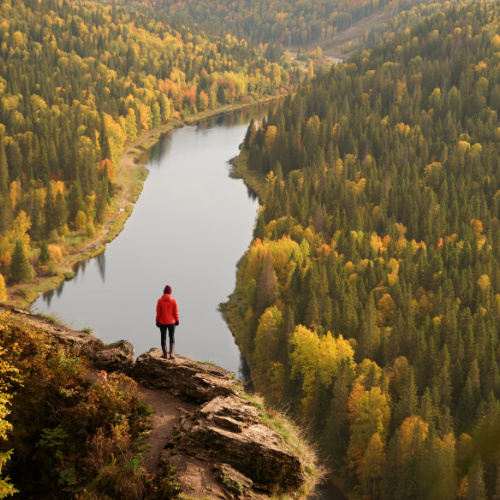
AntonSokolov/Shutterstock
When Is the Best Time to Visit Russia?
The best time to visit Russia is during the shoulder seasons of May to June and September to October. During these months, the weather is generally mild and sunny across most of the country, with fewer crowds and lower prices than during the peak summer season of July and August.
Here are some of the benefits of visiting Russia during the shoulder seasons:
- Mild weather: Russia has a vast territory with a variety of climates, but the shoulder seasons offer mild and pleasant temperatures across most of the country. This makes it ideal for sightseeing, exploring, and enjoying the outdoors.
- Smaller crowds: The shoulder seasons are less crowded than the peak summer season, so you’ll be able to enjoy Russia’s popular tourist attractions without having to deal with large crowds. This is especially important if you’re visiting popular destinations like Moscow, St. Petersburg, and the Golden Ring.
- Lower prices: Prices for flights, accommodation, and activities are generally lower during the shoulder seasons than during the peak summer season. This means you can save money on your trip without having to sacrifice quality.
Here are some specific examples of how you can enjoy the most of Russia during the shoulder seasons:
- May to June: The weather in May and June is typically sunny and warm, with occasional showers. This is a great time to visit for sightseeing in Moscow and St. Petersburg, exploring the Golden Ring, and hiking in the Ural Mountains.
- September to October: The weather in September and October is also typically sunny and warm, with occasional showers. This is a great time to visit for seeing the fall foliage in Siberia, visiting Lake Baikal, and attending the White Nights Festival in St. Petersburg.
While there are many great times to visit Russia, if you’re looking for the best weather and the most opportunities to enjoy the country’s outdoor activities, then we recommend visiting during the shoulder seasons of May to June and September to October.
 Average Temperatures by Month
Average Temperatures by Month
|
Jan |
Feb |
Mar |
Apr |
May |
Jun |
Jul |
Aug |
Sep |
Oct |
Nov |
Dec |
| Fahrenheit |
21°
|
23°
|
32°
|
45°
|
60°
|
68°
|
73°
|
70°
|
59°
|
47°
|
34°
|
25°
|
| Celsius |
-6°
|
-5°
|
-1°
|
7°
|
16°
|
20°
|
23°
|
21°
|
15°
|
8°
|
1°
|
-4°
|
Climate in Russia
Summer Season in Russia
Russian summers, particularly in the western parts of the country, are generally warm and pleasant, with long days and moderate temperatures, making it an ideal time for outdoor activities and exploring the country's vast natural and cultural attractions. In Siberia and the Far East, summers are shorter and cooler. This season is also marked by the famous White Nights, especially in northern regions like St. Petersburg.
Rainy Season in Russia
Russia does not have a typical rainy season like tropical regions. However, the country experiences most of its rainfall during the summer months, with varying intensity across different regions. The rain during this period is usually not prolonged but can be quite heavy at times.
Winter Season in Russia
Winters in Russia are famously harsh and cold, particularly in Siberia and the Far East, where temperatures can plummet to extreme lows. The western parts, including Moscow and St. Petersburg, also experience cold winters with snowfall. This season is characterized by short days, and in some northern regions, polar nights occur. Winter in Russia is a time for traditional activities like ice skating, skiing, and attending cultural events, despite the challenging weather conditions.
Our Recommendations
| Destination |
Jan |
Feb |
Mar |
Apr |
May |
Jun |
Jul |
Aug |
Sep |
Oct |
Nov |
Dec |
| Russia |
 |
 |
 |
 |
 |
 |
 |
 |
 |
 |
 |
 |






